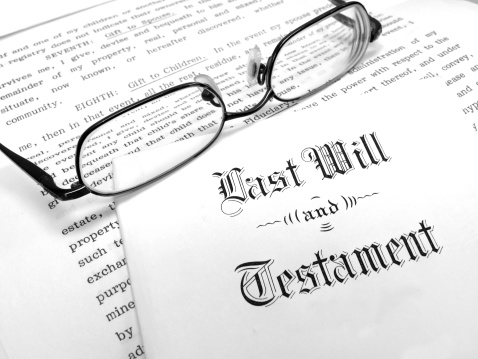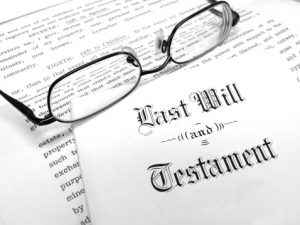Who WILL You TRUST with Your Estate?

 The idea that one should plan for their death and formalize an estate plan can certainly be grim and even a bit despairing. Consequently, without the aid of financial planning professionals, estate planning all too often becomes a seemingly forgotten aspect of many people’s financial plan. However, it is essential to provide for the well-being of your family members and loved ones in the event of your death and ensure that your wishes are met.
The idea that one should plan for their death and formalize an estate plan can certainly be grim and even a bit despairing. Consequently, without the aid of financial planning professionals, estate planning all too often becomes a seemingly forgotten aspect of many people’s financial plan. However, it is essential to provide for the well-being of your family members and loved ones in the event of your death and ensure that your wishes are met.
People often wonder when it is an appropriate time is to begin the estate planning process and organize your estate. As Donna Summer famously stated, “[You] work hard for your money” and would like to protect and preserve your wealth. Therefore, it’s expected that you would want control over what happens to your assets after you die. There are several strategies to choose from to ensure your assets are distributed according to your wishes and in a timely fashion; this is what constitutes your estate plan. Just as there isn’t a cookie cutter financial plan, the same could be said of your estate plan. The right strategy depends on your individual circumstances. For some, a trust can be a useful and practical tool. For others, it may be more than is necessary and a will would suffice. The question then becomes, “What is a trust and how does it differ from a will?”
What is a Will?
A will, or more accurately, a last will and testament is a written document that is signed and witnessed, that specifies how an individual’s property would be distributed at the time of their death. It is a revocable document whereby provisions can be altered or canceled at any time during your lifetime. One of the primary purposes in creating a will is the appointment of guardianship for your children. Indeed, a conventional will is comprised of three primary features; guardianship, assets, and real property such as homes or land.
What is a Trust?
A trust agreement is a legal document that spells out the rules that you want followed for property held in trust for your beneficiaries that provides lifetime and after-death property management. Furthermore, common objectives of a trust are to reduce the estate tax liability, protect property in your estate, plan for the possibility of your own incapacity, and to avoid probate. There are several essential components of a trust, including; a grantor (person setting up the trust), the objective of the trust, a type of trust (i.e. special needs trust, revocable living trust, etc.), property, beneficiary, trustee (person in charge of the trust), and rules to be followed.
Typically, there are a number of triggering events that can serve as a “push notification” and signal to an individual that it is time to organize his or her estate by creating a living trust or last will and testament. Additionally, after an individual has created a will they should think about updating his or her will at least every five years.
Triggering Events
If you have not yet made a will or updated it in many years, the following events should provide you with the necessary motivation to meet with Yeske Buie so we can assist you in organizing your estate plan:
A Change in Marital Status
Given the fact that many distribution details are directly associated with the significant others in our lives, it is likely that the beneficiaries named in your estate documents will be significantly changed with a change in marital status. It is important to include or remove your spouse to reflect who you want as your beneficiary.
Second marriages also present unique estate planning concerns. You must ensure that your new family is provided for and any children or spouses from previous relationships are dealt with accordingly in your estate planning documents by either removing them or altering their entitlements.
Having Kids
When you have your first child, it is important to have a will in place so they are properly provided for. While the laws on intestacy (dying without a will) will ensure that your children are entitled to a portion of your estate, the ultimate division may not be as you would have preferred.
More importantly, if you have minor children, your estate documents will name a guardian for your child in the event that both parents die. In order to ensure that your desired guardian can easily take care of your child, you should design a will with a guardianship clause. Once your child becomes an adult, their needs will change and your will should be updated accordingly.
Buying a Home
One of the major life event that individuals may experience is buying a home and it can have a significant change in the value of your estate. Buying or selling a large asset is a strong indicator that you should update your will and the distribution of your assets. As well, if your estate value increases greatly, there may be significant tax planning opportunities available.
Buying a home is also an indication that you have moved. If you have moved, you should be sure to update your estate planning documents to reflect the most up to date information.
A Significant Change in Health
This is the cruelest of reminders. If you or your loved ones have recently had a health scare or have felt the reality of your own mortality, it may force you to realize that you haven’t prepared for your ultimate demise. In the face of this realization, you will want to make sure that you have prepared properly for your death. In addition to many other important things, this includes creating or updating your estate planning documents.
Also, if someone you have named in your will has passed away or become incapacitated, you should update your estate planning documents to reflect these changes.
It’s Been Awhile
As previously mentioned, it is recommended that you review or update your estate planning documents every five years. In addition to the reasons listed above, many things change over time including laws, health, relationships, your personal priorities, and many other factors will affect how you want to distribute your estate. It is important to make sure that your will and all estate planning documents are up to date and in accordance with your wishes.
Since estate planning can often be at the back of people’s minds, time can fly by and the essential documents that are needed are all too often not put into place. It is important to meet with an estate planning professional to organize your estate to protect you and your families’ wishes.
